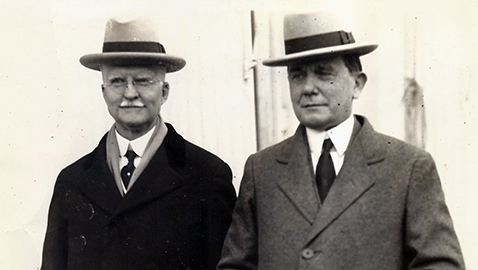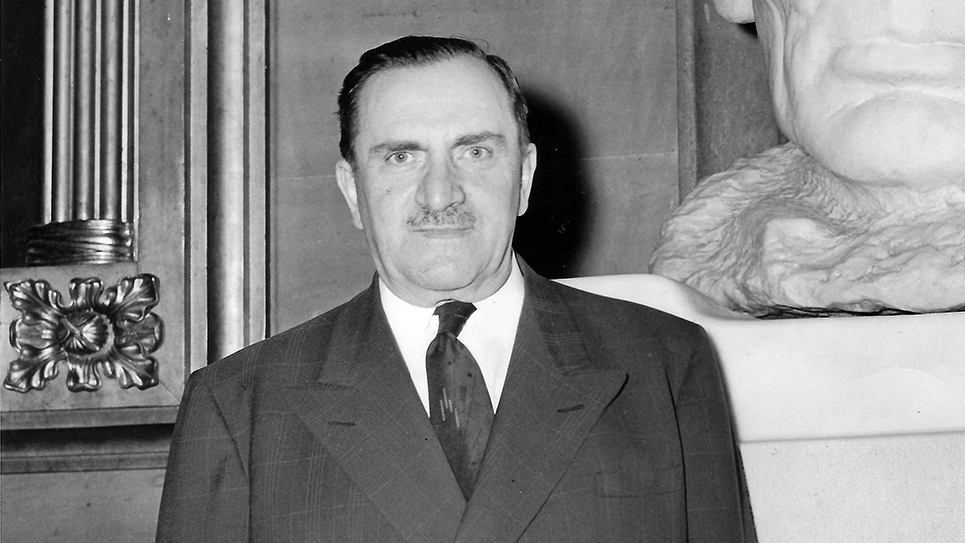By Ray Hill
By the last week of June, it was obvious to virtually everyone Senator John Knight Shields was in deep political trouble. Shields had been the last man elected by the Tennessee General Assembly to serve in the United States Senate after having served for a decade on the state Supreme Court. Shields had won a contentious reelection campaign in 1918 against incumbent governor Tom C. Rye. Rye had pledged all out support for President Woodrow Wilson and his administration. Wilson had died February 3, 1924 and the specter of the dead former president hung over Shields’ candidacy like a black cloud. Shields faced two formidable challengers inside the Democratic primary, General Lawrence D. Tyson and former state Supreme Court justice Nathan L. Bachman. Both Tyson and Bachman had excoriated Shields for his failure to support President Wilson and the League of Nations. There were tens of thousands of Tennesseans who were livid with Senator Shields because he had been reelected in 1918, promising to back Wilson. Shields stubbornly insisted he had been right to support reservations to the Treaty of Versailles and that it had been a patriotic act on his part, due to his love for his country and concern for the sovereignty of the United States of America.
It had been Shields’ junior colleague in the Senate, Kenneth D. McKellar, who had likely saved him from defeat in 1918. President Wilson had been ready to write a letter for publication indicating Shields was no friend to him or his administration. Shields had telephoned McKellar from Tennessee, repeating the strong rumor the President was going to write a letter, which would aid the candidacy of his opponent, Governor Rye. McKellar called on Wilson at the White House and was stunned when the President readily confirmed he did indeed intend to write a letter to be used against Senator Shields. McKellar proceeded to beg, cajole, and argue with the President, insisting Shields would back Wilson. President Wilson, according to McKellar’s recollections years later, merely disagreed with the senator, insisting Shields would not keep his word. That had never occurred to McKellar, who was relieved when the President did not write the letter. McKellar was utterly astonished when Senator Shields, after having been reelected, said the President could go straight to Hell. McKellar had been easily reelected over significant opposition in 1922 and was the most popular Democrat in Tennessee. Senator McKellar, through a column published by John D. Erwin, the Nashville Tennessean’s Washington correspondent, denied an accusation made by the Memphis Commercial Appeal, that he was backing John K. Shields. McKellar said he had no idea which of the three candidates the Commercial Appeal was supporting, but he was certain none of them would “uphold or indorse its malevolent, vindictive and unreasonable fight on me and when there is no sense in attempting to make me an issue.” McKellar, whose chief opponent in the 1922 Democratic primary had been a candidate with very close ties to the Commercial Appeal, as well as an ownership interest in the newspaper, recalled, “My fight for and belief in the League of Nations is known to all intelligent people in Tennessee, and I have not changed my position on that or any other question covered by my record.” Still, the senator was highly skeptical of the concern the Commercial Appeal expressed for the League. McKellar wryly noted “…when a statement of my record containing my approval of President Wilson and all his policies, including the League” was made public and put into the Congressional Record by a colleague, the Commercial Appeal had immediately attacked him by publishing the criticism of McKellar’s position by a Republican senator. McKellar said the Commercial Appeal, now so stoutly behind the League of Nations gave him no credit for being a stalwart in the fight to back President Wilson during the treaty’s darkest days. “I think in the past the people of Tennessee have given the Commercial Appeal’s much-advertised and boasted mental superiority true appraisement,” McKellar drily said.
McKellar pointed out he was never one to hide his views or opinions. “I should think the Commercial Appeal, of all newspapers, would know from experience that when I do become a ‘spear-toter’, I am quite open about it.” Senator McKellar said, “I think I may, without boasting, say I have been fairly successful in my ‘spear-toting’.” McKellar added the Commercial Appeal certainly qualified in its own right as a spear-toter as the newspaper “spears me with it, too.”
McKellar’s response to the accusations of the Commercial Appeal largely killed off any controversy about which of the three candidates he was supporting in the Democratic primary.
While General L. D. Tyson’s senatorial campaign was amply financed, both by himself and his friends in the business community, Senator John Knight Shields was not without resources. Perhaps sensing residual hostility to his candidacy on the part of many Democrats in Tennessee, the senator relied on personal meetings, large newspaper advertisements, and his incumbency. A poor speaker, Shields made few attempts to harangue crowds across the state. Nor was Senator Shields without friends and supporters in Tennessee. The senator’s campaign reprinted an editorial from the Shelbyville Gazette strongly endorsing his reelection. The Gazette recalled the many legislative accomplishments of Woodrow Wilson during his first administration and reminded readers Senator John K. Shields had supported every initiative proposed by the President. When President Wilson had proposed a draft to raise an army, the Shelbyville Gazette remembered it had been a highly unpopular measure and Tennessee’s Congressional delegation had opposed the draft, save for Senator John K. Shields, who had sided with Wilson. Shields had agreed with Wilson a draft was needed to raise an adequate army and the Gazette said the senator “had the courage to stand by his conviction and do his duty regardless of the effect it might have on his political fortunes.” Shields had also supported the President when Wilson sought greater, almost absolute control over the departments of the government during the First World War. Senator Lee Overman of North Carolina had sponsored the legislation for Wilson and sought out John K. Shields. “I selected Senator John K. Shields of Tennessee as the strongest member of the Judiciary Committee to study the bill from a constitutional standpoint and make the argument along that line,” Overman said. “The President is greatly pleased with the work of Senator Shields.”
The Shelbyville Gazette nicely summed up the view of Senator John Knight Shields taken by his admirers; namely the senator was an independent thinker who placed his convictions above partisan politics. John K. Shields was a man unafraid of taking political risks when he believed the country’s welfare and well-being were at stake. To those who supported John Knight Shields, the senator was truly a statesman.
Evidently, Lawrence D. Tyson was stung by Judge Nathan Bachman’s campaign opener in Winchester, Tennessee. As a business magnate, publisher of the Knoxville Sentinel, and a former general, Tyson was apparently unaccustomed to criticism. Sorely peeved, the General complained Bachman had taken two hours to “read” his speech in which “he devoted only a short time to Senator Shields and a great deal of time to me.” Tyson could only conclude Judge Bachman was not “as much interested in beating Senator Shields as he is in beating me.” Tyson groused, “as a matter of fact, Judge Bachman has done nothing during this campaign to indicate that he was running particularly against Senator Shields.” Tyson had clearly overlooked Bachman’s severe criticism of Senator Shields during his speech. The General said, “It is well known that I have had to go out and do all the fighting against Senator Shields…” Tyson cited his feud with the senior senator carried out through the pages of the Knoxville Sentinel since February of 1923; what Tyson omitted was he was anticipating running against Shields even then. The purchase of the Sentinel seemed to be a particular tender spot for the thin-skinned General Tyson. The General took special pains to attempt to refute Bachman’s allegations that Tyson’s purchase of the Sentinel was solely due to aid his political ambitions. Tyson grumbled he had not sought to buy the newspaper; rather it had been offered to him for sale. “I submit to fair-minded people of the state that the Knoxville Sentinel has not been used in my interests alone, but has been used in the interest of the Democratic party since I purchased it and it will continue to be so used,” Tyson said. It was hardly a convincing refutation of Bachman’s charges. Tyson griped Bachman had “his organ in the Chattanooga Times” while Senator Shields had strong newspaper support from the Nashville Banner, which the General noted was worth far in excess of a million dollars, as well as that of the Memphis News-Scimitar. General Tyson lamented Bachman had turned “his bitterness and unfair criticism on me because I am conducting a Democratic newspaper in the interest of the Democratic party.”
Rice A. Pierce, a former congressman from Union City, Tennessee, gave Senator Shields a ringing endorsement for reelection, which was reprinted in newspapers all across the state. Pierce believed “the second thought” of many Tennessee Democrats had caused them to reconsider supporting Senator Shields. Pierce thought Tennesseans “have always admired courage in their public men” and Shields had proven his own political courage time and again.
Nor was every Tennessee veteran for General Lawrence D. Tyson. Senator John Knight Shields won the commendation of a group of disabled veterans for his work on their behalf. Praising the World War Veterans’ Act, the group gave credit to Senator Shields, whom they considered “one of the most potent factors” in the passage of the bill. The approximately 1,000 disabled veterans of Tennessee extended their “thanks and appreciation” to Senator Shields for his untiring efforts on their behalf.
The Nashville Tennessean continued its longstanding feud with its rival, the Nashville Banner. In an editorial the Tennessean was astonished by what it considered the hypocrisy of the Banner in its all out support of Senator John Knight Shields. The Tennessean huffed the Banner valued neither “party nor principle”, as the Banner had strongly supported the reelection of Senator K. D. McKellar in 1922. McKellar, the Tennessean pointed out, was the political polar opposite of John Knight Shields. “McKellar supported the League of Nations and advocated a soldier bonus,” the editorial said. “Senator Shields voted against the League of Nations and bitterly opposed the soldier bonus.” The Tennessean marveled, “It is evident from the Banner’s attitude in the two races that principle and policies have no bearing with it.” The Tennessean editorial sneered the Banner “boasts that it is independent and owes allegiance to no party” but one could only conclude “the Banner is merely an organ of its personal friends, regardless of the best interests of the state and nation.” What the Tennessean failed to note was that it had been opposed to McKellar in spite of his support for the League of Nations and advocacy of the soldier’s bonus. The owner and publisher of the Nashville Tennessean, former U. S. senator Luke Lea, had been defeated by Kenneth McKellar in the 1915 Democratic primary. Luke Lea was equally as guilty as the Stalhman family, owners of the Banner, of following a policy that was less in the best interests of the state and its people than Colonel Lea’s own personal pets and prejudices. Such is the domain of newspaper publishers.
In less than a month, Tennessee Democrats would go to the polls and select their nominee for the United States Senate.







